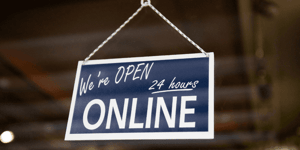If you've been in the space for even a second, you've probably heard a guru banging on about how he turned $0.10 into $10,000 just by selling products online in a Marketplace.
Sounds amazing, right?
Hold your horses. If you're looking to launch your business, and make it your sole source of income, then maybe Marketplaces aren't for you.
Why relying on one online Marketplace isn't the answer?
At least it isn't sometimes. Many people read our article Etsy or eBay and think that this is the answer to achieving their entrepreneurial dreams. After all, using an online Marketplace has its benefits:
- These platforms are built so that It's super easy to set up
- You don't need to have any technical knowledge to maintain your store
- It's relatively cheap to get up and running
- You instantly get access to thousands of customers and support
Marketplaces are a great way to kickstart your business, but once you've grown your store past a certain point, the limitations of sticking to one platform will start to weigh on you. Here are some limitations of relying on one online Marketplace to grow your business:
Stunts your growth
When you're relying on one Marketplace, you never get to grow your business beyond the confines of that specific platform. This means that you aren't able to fully develop your own brand and identity. When your customers purchase a product from your store, they aren't thinking that they just purchased an item from your brand, they're thinking that they just purchased a product from Etsy or eBay.
Profit margins aren't as high
When you're operating out of a Marketplace platform you're constantly in this battle between balancing the benefits of the platform and the fees that they charge you just for using their platform. What often happens is sellers find themselves losing out on margin, because of the cost of running their business. Depending on how low your profit margin is, this could harm your ability to expand your business in the long-term.
You're limited to one market
As we've covered before, Marketplaces are great search engines, but they are insulated and often gamified, so you end up at the bottom of the search results, unless you're an extremely popular store. It's often more difficult to rank in a Marketplace system than it is to rank on Google. This, coupled with the fact that you have little to no control over keywords on an online Marketplace, like Etsy, makes it even more difficult to increase the visibility of your store across multiple audiences.
You don't own your land
Marketplaces are owned by someone else entirely; someone else who has a different set of values, ambitions and ideas to you. If you're relying on one platform to sell your goods, you're essentially putting your entire business in the hands of a stranger. And he can choose to suspend your business at any time.
Additionally, you're subject to any changes in terms and conditions or algorithm changes that come into effect for the wider Marketplace. While it might be incremental for their business, it might be devastating for your business. And no-one wants to be caught on the backfoot. For example, Amazon used to allow sellers to provide incentives for their customers to review them, but a policy change came into effect which disallowed this and many businesses were hit hard.
How can you diversify your income streams?
As the old saying goes, don't put all your eggs in one basket. As many people have seen, since the COVID-19 crisis hit, your main source of income can suddenly disappear. This is why it's so important to diversify your income streams, so you have something to fall back on.
Your own website
Never underestimate the power of a brilliant "window display''. If you invest in your own site, you have control over how it looks, and more importantly you have control over your brand (even if you move to different platforms to sell products). This gives you more opportunity to drive brand loyalty because you own the sale and the customer.
- Brand your products and boxes to drive customers to your website
- Add your website and logo wherever possible
- Connect with customers as a brand rather than as an individual
Additionally, owning a website allows you to use a range of marketing that you can't do through a Marketplace platform. For instance, launching your own eCommerce website allows you to utilise blogs and drive traffic and leads to your website. You can also optimise product listings for search engines, without limitations.
Other online marketplaces
Moving your eCommerce business to a multi-channel model opens up several touchpoints for customers to reach your business. It also means that you're reaching an even bigger audience. In a worse case scenario, if your store gets suspended on one platform, you will always have a back-up store that's running and generating revenue. Data from Shop.org shows that a lack of channel integration causes retailers to lose up 2-4% of revenue.
There are many eCommerce platforms that can be used in a multi-channel model. Choosing a platform is an important task that can make or break your business in the long-run.
 Are you affected by the Sendle service suspension? We have an immediate shipping solution for you!
Are you affected by the Sendle service suspension? We have an immediate shipping solution for you!










 Facebook
Facebook Twitter
Twitter Instagram
Instagram Linked In
Linked In YouTube
YouTube